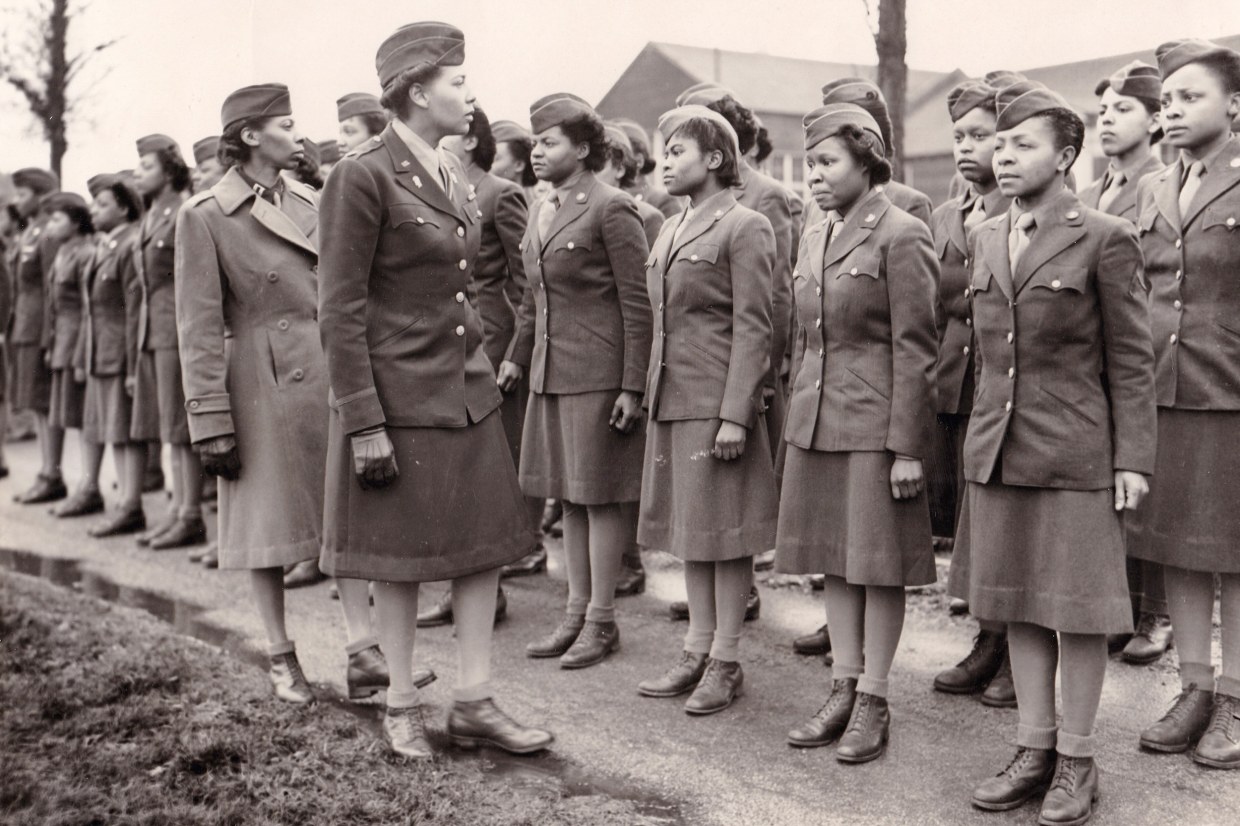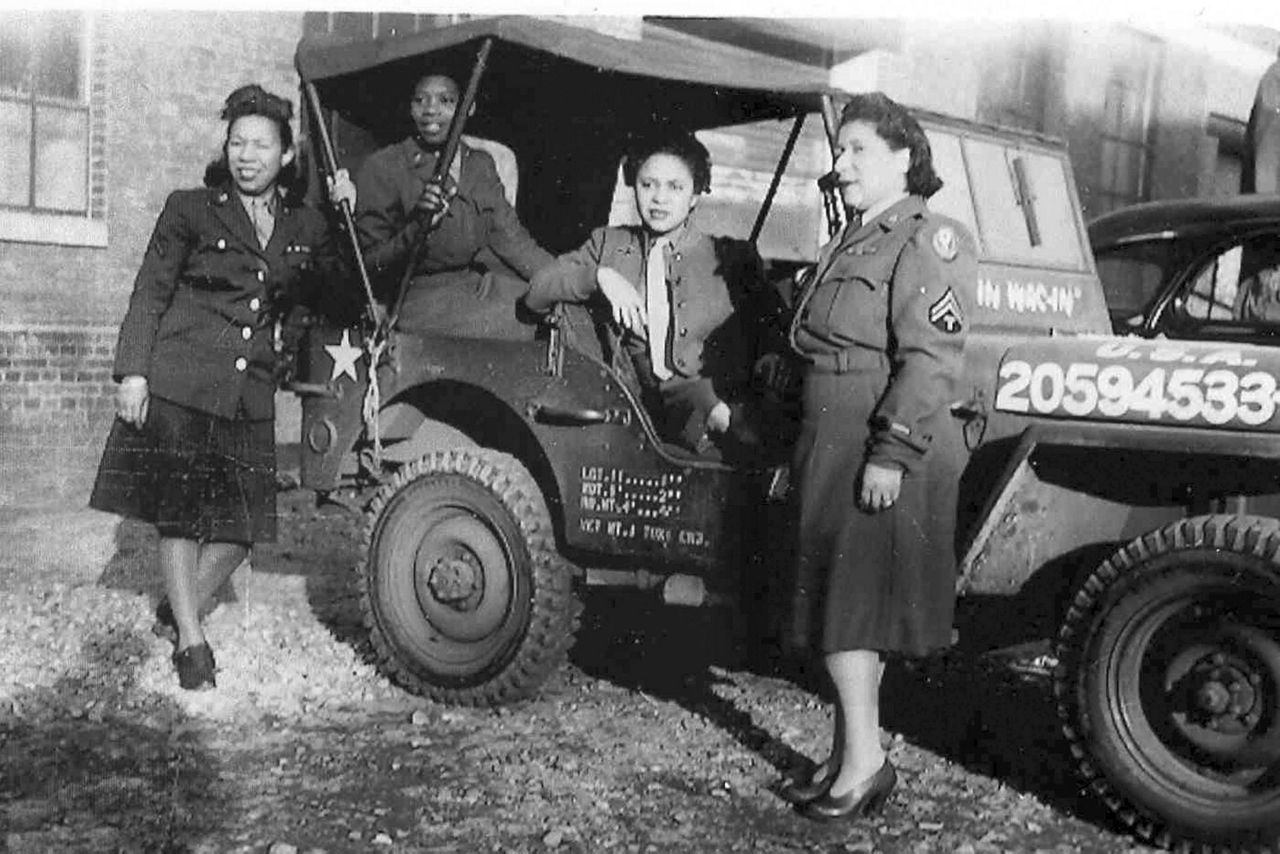After decades of delayed recognition, the groundbreaking achievements of the 6888th Central Postal Directory Battalion, better known as the Six Triple Eight, will finally be honored with the Congressional Gold Medal.
The unit, the only all-Black, all-female battalion to serve in Europe during World War II, will be celebrated in a ceremony on Tuesday at Emancipation Hall in the Capitol Visitor Center.
House Speaker Mike Johnson, along with other congressional leaders, will present the medal to the family of the unit's commander, Lieutenant Colonel Charity Adams Earley.
The event marks the culmination of a long-running effort to properly recognize the battalion’s extraordinary contributions during the war, contributions that for too long were overshadowed by the historical narratives of their white counterparts.
The Six Triple Eight was tasked with a monumental mission during their time overseas. Facing a massive backlog of mail intended for American troops stationed in Europe, the women of the 6888th were assigned to sort and deliver millions of letters and packages.
In an incredible feat, they cleared a backlog of about 17 million pieces of mail in just three months, working around the clock and completing their assignment twice as fast as military leaders had projected.
Following their success in England, the battalion continued their service in France before returning home to the United States. However, like many Black units during World War II, their contributions were largely forgotten in the annals of American history — until now.
"This really shows how long this recognition took," said Kim Guise, senior curator and director of curatorial affairs at the National WWII Museum. "It is really important to recognize the accomplishments of these women and what they went through to serve their country in war time."

Of the 855 women who served in the Six Triple Eight, only two are still alive today. Their longevity is a testament to their resilience, but it also underscores how long it has taken for their heroism to be acknowledged by the nation they served so loyally.
Wisconsin Representative Gwen Moore, who co-sponsored the legislation to award the medal, emphasized that honoring the Six Triple Eight is not merely about correcting the historical record but also about celebrating their selflessness and service.
"These heroes deserve their dues; and I am so glad their story is being told," Moore said. "I am especially honored to ensure my constituent Ms. Anna Mae Robertson and the many others who served with her, are recognized for their selfless service."
The legislative effort to award the Congressional Gold Medal to the Six Triple Eight culminated in a unanimous 422-0 vote by Congress in 2022. The overwhelming support across political lines demonstrated a shared recognition of the battalion’s service and sacrifice.
"It’s overwhelming," retired Major Fannie Griffin McClendon said after the vote. "It’s something I never even thought about."
McClendon, who lives in Arizona, continued her military service after World War II, joining the Air Force after integration and eventually retiring in 1971. She made history by becoming the first woman to command an all-male squadron under the Strategic Air Command.
The origins of the Six Triple Eight’s mission date back to a time when Black women were fighting for the opportunity to contribute equally to the war effort. African-American organizations had long advocated for the inclusion of Black women in overseas operations. Their efforts eventually led to the formation and deployment of the 6888th.
"They kept hollering about wanting us to go overseas so I guess they found something for us to do overseas: Take care of the mail," McClendon recalled. "And there was an awful lot of mail. They expected we were gonna be there about two or three months trying to get it straightened out. Well I think in about a month, in a month and a half, we had it all straightened out and going in the right direction."

Faced with poor working conditions, racism, and sexism, the women of the Six Triple Eight persevered. They developed an innovative mail-tracking system using locator cards with each service member's name and unit number, ensuring that soldiers received long-awaited letters from home.
They processed approximately 65,000 pieces of mail per shift across three shifts daily, ensuring that morale among American troops remained high.
The importance of mail during wartime cannot be overstated. Letters from home served as vital lifelines for soldiers, providing emotional support and maintaining connections to their loved ones.
By restoring the flow of communication between soldiers and their families, the Six Triple Eight contributed significantly to the war effort beyond the battlefield.
Despite their remarkable accomplishments, the unit returned home to a country that was slow to recognize their contributions. For decades, the story of the Six Triple Eight remained relatively unknown outside of military and academic circles.
It was only in recent years that the battalion began to receive broader recognition. In 2018, a monument was erected at Fort Leavenworth, Kansas, in their honor.
The battalion was awarded the Meritorious Unit Commendation in 2019. Their story has also been preserved and shared through documentaries such as "The Six Triple Eight" and dramatized for a larger audience with a 2024 Netflix film directed by Tyler Perry, starring Kerry Washington.
For many historians and advocates, the Congressional Gold Medal ceremony represents not only a moment of celebration but also an opportunity for reflection on the barriers these women faced and overcame.

The Six Triple Eight's experience was emblematic of the broader struggles faced by Black Americans during the era. Although they volunteered to serve and risked their lives for their country, they did so in the face of systemic discrimination.
They were often segregated, given lesser assignments, and denied recognition that their white counterparts received as a matter of course.
Yet through their service, they proved that patriotism and excellence know no color. Their achievements helped pave the way for future generations of Black women in the military and beyond. They demonstrated that given the opportunity, Black Americans could meet and exceed any challenge placed before them.
As the ceremony unfolds at Emancipation Hall, the names and deeds of these women will be elevated into the national memory, a place they should have occupied long ago.
For the families of the Six Triple Eight, and for all Americans, this long-overdue recognition serves as a reminder of the resilience, determination, and unbreakable spirit that defines the best of the nation.
While only two of the original battalion members are still living to see this honor, the legacy of the Six Triple Eight endures. It lives in the records they broke, the barriers they shattered, and the generations they inspired.
Tuesday’s ceremony is not just a commemoration of a single battalion’s achievements. It is an acknowledgment of an essential chapter in American history, one that teaches future generations about courage, perseverance, and the importance of fighting for a country even when that country does not always fight for you.
/https://tf-cmsv2-smithsonianmag-media.s3.amazonaws.com/filer_public/e3/f7/e3f7bbaa-75f6-4e92-bf8c-ecc2bb12ca2a/kerry-washington.jpg)
As America continues to grapple with its complex history of race and service, the story of the Six Triple Eight stands as a beacon of hope, a testament to the power of determination in the face of adversity. Their long-overdue recognition with the Congressional Gold Medal is a powerful symbol that their sacrifices will not be forgotten.




